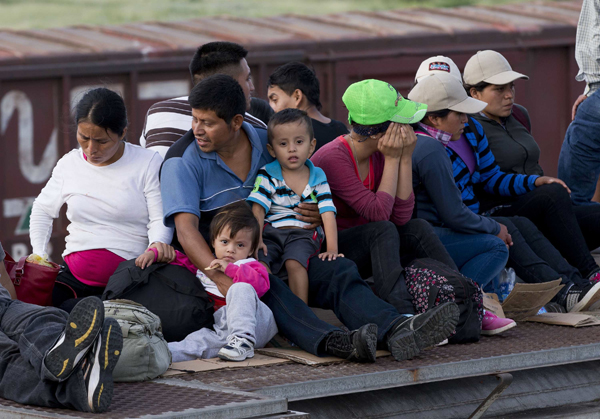A Question That Deserves More Thought...
Immigration and Revolution
June 8, 2015 | Revolution Newspaper | revcom.us
Editors’ note: The following thoughts provoked by “Stop The Demonization, Criminalization, and Deportations of Immigrants and the Militarization of the Border!” (from the 5 Stops) are being contributed by a reader to the ongoing wrestling and wrangling with the relationship between this social fault line and making revolution in this country and worldwide.

Central American family on a freight train heading toward the U.S.-Mexico border, 2014. (AP photo/Eduardo Verdugo)
One point that does seem important is how the Revolutionary Communist Party is integrating the question of immigration into our work. I was happy to see that it is a focus of attention on the “5 Stops.” Still, it feels that our web site is having difficulty giving adequate attention to this other “open sore” given all of the other demands on our forces.
I am particularly aware of this issue, as it has been and continues to loom very large in Europe. Alexis de Tocqueville was right in saying that the situation of Black people in the U.S. was central to its history and identity, and I think we have been correct in emphasizing this again in articles recently, as the continuing pertinence of this is playing out much more sharply now. The immigration question, on the other hand, may well be the general question or common denominator between all (or virtually all) of the imperialist countries, even if the particularities can look different from one place to another.
Bob Avakian, "Why do people come here from all over the world?"
The very way the world is organized by imperialism, and especially the deep immiseration everywhere and violent disruption in more and more places, continues to create an ever intensifying pressure for immigration. As we see with such horrific regularity, even the real possibility of drowning at sea, which I am sure all of the “candidates” are well aware of, doesn’t slow down desperate attempts in the slightest. In addition to the disastrous situation in so much of the “third world” (and even countries that seemed only a few years ago to be relatively immune such as Libya) there is, I believe, an important cultural aspect linked to globalization: people generally are much more aware of the situation in the world as a whole. They are not the “blank slates” as Mao described the Chinese peasants.1 Even (or especially?) in economically undeveloped countries like Nepal, people are likely to have friends or family members who have worked in the Gulf states or driven a truck in Iraq, or even a “lucky” cousin who settled in Europe, as well as the countless others caught at the bottom of the globalized food chain as security guards or entombed in brothels in India.
There is absolutely no reformist solution to this problem... neither to the intensifying and glaring inequalities nor the migratory pressures that it intensifies. And, of course, there is the political fallout from this in the imperialist countries themselves—mainly, now, in the negative form of the rise of the fascist right and the general rightward drift of all of political life and, as we have seen, a fueling of perverse and reactionary tendencies among important sections of the most oppressed masses themselves, especially Islamic fundamentalism. But the opposite exists as well—there is a basis to win over large sections of people who really don’t want to have to live protected by the “Roman legions.” And despite the chauvinist waves, there continue to be broad sections that have at least a beginning picture of who are the victims and who are the source of the problems. And there is the great advantage that only a genuine revolutionary line can even begin to show a potential solution.
I am convinced that correctly identifying and correctly working on this faultline will be central to the rebirth of a revolutionary process in the imperialist countries. How does it relate to “fight the power, and transform the people, for revolution”? How does it relate to winning the most oppressed to be in the forefront as “emancipators of humanity”? These questions deserve thought.
1. In a 1958 essay, Mao wrote: “Apart from their other characteristics, the outstanding thing about China’s 600 million people is that they are ‘poor and blank.’ This may seem a bad thing, but in reality it is a good thing. Poverty gives rise to the desire for change, the desire for action and the desire for revolution. On a blank sheet of paper free from any mark, the freshest and most beautiful characters can be written, the freshest and most beautiful pictures can be painted.”
Volunteers Needed... for revcom.us and Revolution
If you like this article, subscribe, donate to and sustain Revolution newspaper.






